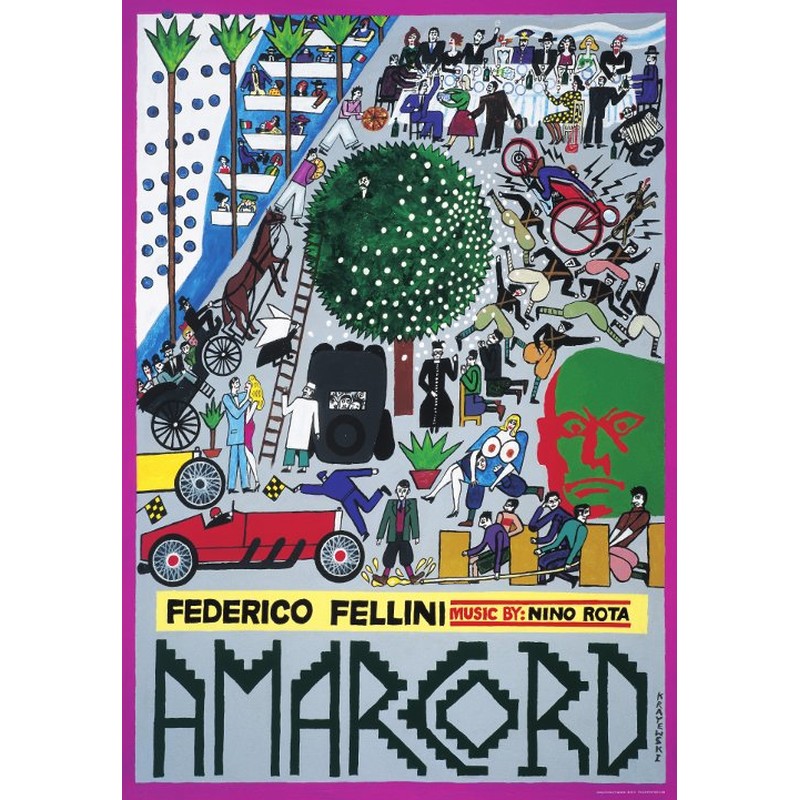


Titta's friend Ciccio daydreams about being married to his crush, Aldina, by the giant face of Mussolini. When Titta goes to confession, he is able to avoid telling Don Balosa about his masturbatory activities and attempt to seduce Gradisca, a glamorous older woman, because the priest is more concerned with floral arrangements.įascist officials come for a tour, and the schoolchildren are required to perform athletic routines for their approval. All Titta and his fellow students can do is goof off or skip class when not called upon to solve math problems or identify obscure historical details. School under Fascism is a tedious cavalcade of dry facts recited by instructors of varying levels of engagement and skill.

The townspeople play pranks on one another, explode fireworks, cavort with loose women and make lewd noises when the civically minded lawyer lectures on the history of the region. As night falls, the inhabitants of Borgo make their way to the village square for a traditional bonfire in which the Old Witch of Winter is ritually burned. In a Borgo San Giuliano, a village near Rimini, the arrival of fluffy poplar seeds floating on the wind heralds the arrival of spring. The film won the Oscar for Best Foreign Language Film, and was nominated for two more Academy Awards: Best Director and Best Original Screenplay.

Fellini skewers Mussolini's ludicrous posturings and those of a Catholic Church that "imprisoned Italians in a perpetual adolescence" by mocking himself and his fellow villagers in comic scenes that underline their incapacity to adopt genuine moral responsibility or outgrow foolish sexual fantasies. Titta's sentimental education is emblematic of Italy's "lapse of conscience". Benzi became a lawyer and remained in close contact with Fellini throughout his life. The titular role of Titta is indeed based on Fellini's childhood friend from Rimini, Luigi Titta Benzi. The title then became a neologism of the Italian language, with the meaning of "nostalgic revocation". The film's title is a univerbation of the Romagnolo phrase a m'arcôrd ("I remember"). The Belcourt Theatre does not provide advisories about subject matter or potential triggering content, as sensitivities vary from person to person.īeyond the synopses, trailers and review links on our website, other sources of information about content and age-appropriateness for specific films can be found on Common Sense Media, IMDband as well as through general internet searches.Amarcord ( Italian: ) is a 1973 Italian comedy-drama film directed by Federico Fellini, a semi- autobiographical tale about Titta, an adolescent boy growing up among an eccentric cast of characters in the village of Borgo San Giuliano (situated near the ancient walls of Rimini) in 1930s Fascist Italy. A glorious testament to Fellini’s singular talent.” - Eric Blume, The Film Experience
#Amarcord de federico fellini movie
“If ever there was a movie made entirely out of nostalgia and joy, by a filmmaker at the heedless height of his powers, that movie is Federico Fellini’s AMARCORD… Fellini was more in love with breasts than Russ Meyer, more wracked with guilt than Ingmar Bergman, more of a flamboyant showman than Busby Berkeley.” - Roger Ebert (Jan 4, 2004) “Fellini at his ripest and loudest.” - Time Out “The movie is staunchly and intensely Italian, and Fellini takes great care to both celebrate and indict his culture. Special thanks to the Cinémathèque Royale de Belgique and Gianfranco Angelucci. Supervised by cinematographer Giuseppe Rotunno. Restored by the Cineteca di Bologna in collaboration with CRISTALDIFILM, with funding provided by and the Commune di Rimini. Winner of Fellini’s fourth Academy Award for Best Foreign Language Film (1957), AMARCORD remains one of the director’s best-loved creations, beautifully weaving together Giuseppe Rottuno’s colorful cinematography, Danilo Donati’s extravagant costumes and sets, and Nino Rota’s nostalgia-tinged score. Sketching a gallery of warmly observed comic caricatures, Fellini affectionately evokes a vanished world haloed with the glow of memory, even as he sends up authority figures representing church and state, satirizing a country stultified by Fascism. Federico Fellini returned to the provincial landscape of his childhood with this carnivalesque reminiscence, recreating his hometown of Rimini in Cinecittà’s studios and rendering its daily life as a circus of social rituals, adolescent desires, male fantasies and political subterfuge.


 0 kommentar(er)
0 kommentar(er)
